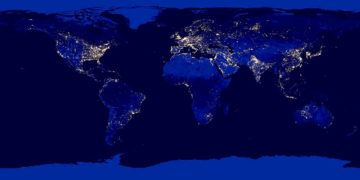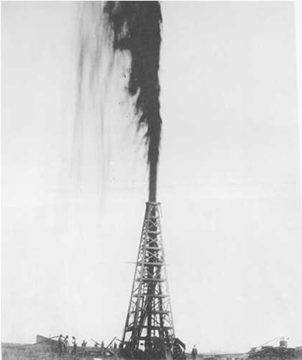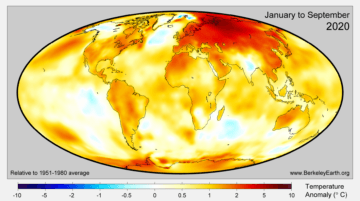by Usha Alexander
[This is the seventh in a series of essays, On Climate Truth and Fiction, in which I raise questions about environmental distress, the human experience, and storytelling. All the articles in this series can be read here.]
“Our plan B has always been grounded in our beliefs around the continued evolution of technology and engineered solutions to address and react to whatever the climate system and its outcomes present to us, whether that be in the form of rises in sea level, which we think you can address through different engineering accommodations along coastal areas, to changing agricultural production due to changes in weather patterns that may or may not be induced by climate change.” —Rex Tillerson, as CEO of ExxonMobil, to shareholders in 2015
***
 For the past few years, I’ve been taking a fairly deep dive into attempting to understand the physical and ecological changes occurring on our planet and how these will affect human lives and civilization. As I’ve immersed myself in the science and the massive societal hurdles that stand in the way of an adequate response, I’m becoming aware that this exercise is changing me, too. I feel it inside my body, like a grey mass coalescing in my chest, sticking to everything, tugging against my heart and occluding my lungs. A couple of months ago, I decided to stop writing on this subject, to step away from these thoughts and concerns, because of their discomfiting darkness.
For the past few years, I’ve been taking a fairly deep dive into attempting to understand the physical and ecological changes occurring on our planet and how these will affect human lives and civilization. As I’ve immersed myself in the science and the massive societal hurdles that stand in the way of an adequate response, I’m becoming aware that this exercise is changing me, too. I feel it inside my body, like a grey mass coalescing in my chest, sticking to everything, tugging against my heart and occluding my lungs. A couple of months ago, I decided to stop writing on this subject, to step away from these thoughts and concerns, because of their discomfiting darkness.
But I’ve discovered that walking away from this matter is no longer something I can just choose to do. For I now experience the world in a different way than I once did, as this grey mass clouds my vision and leaves its residue on everything I touch. I’ve come to see the changing Earth as the greatest single force shaping human affairs into the future, the backdrop against which the human story will play out and respond.
Just as the temperate stability of the Holocene once enabled the shift from nomadism to settled farming and all of civilization, so the ongoing mass extinction of species and the rapidly warming climate will erode our present modes of life and maps of political order to make way for something new. Not just new, but very likely burdened by unprecedented collective hardship that stresses and tests our political systems, economies, infrastructures, and provisioning networks as never before. Some of these systems will fail. Without knowing how extremely or how quickly the planetary changes will occur, but knowing with some predictive capacity—unlike our Paleolithic ancestors—that an essential and irreversible change is underway, makes it difficult not to feel frightened and aggrieved for our future, even if I may not live to see the most startling changes. But then, what I’ve already witnessed has been startling enough.
Coming to terms with everything I’m learning has been a journey. It’s granted me some clarity, but from where I stand, the way to greater understanding looks terrifying and exhausting, more crags and crevasses arrayed before me, stretching to an unknown horizon. I’ve had to pause and ask, what exactly is my destination? And I’m realizing that this adventure will not finally deliver me to any epiphany or place of rest—no fine green valley of flowering optimism, no stalwart fortress of comfort and certitude. My destination is inward. My desire is to reckon with what is, to let my life be transformed by the deepest understanding I can muster of what’s humanely possible and what it means to be alive during this moment on Earth. My hope is to dismantle the illusions that I most fear to lose, that I might thereby dismantle my fear itself, and prepare myself to imagine more sustainable and humane ways to live—and, if I’m very lucky, to inspire others to walk with me, as we all begin to grasp for meaning and metaphor in the coming era of unprecedented transitions.
Thus far, I’ve attempted to do this by looking at the long story of human experience and how our stories both reflect and shape our understanding of ourselves and our world. It is here, I think, that we find the fluid intersections of reality and projection that inform how we approach our world, what we think is right or possible. Our myths, secular and religious, both shape and are shaped by the way we regard science, governance, work, history, society, and future potentials. And for the first time, our stories must now reckon with rapid cultural and material changes on a global scale as well as the emerging dire insights into our planetary future. The narratives that have brought us to this point seem woefully inadequate in facing that future.
Tales of Techno-Optimism
Our world is thick with stories. Gods. Devils. The Invisible Hand of the Market. Original Sin and Salvation. Karma and Kali Yuga. Progress and Liberty. The Enlightenment. Manifest Destinies. Nationalism. Racism. Patriarchies. Capitalism. Consumerism… to name but a few of the grand or enduring narratives. These subtexts silently buttress the more mundane or transient tales we also tell. Some of these narratives are exceedingly common and adaptable, able to assimilate—or inspire—new vernaculars and references across time, place, and shifting fashions. Some have waxed or waned in their explanatory power and usefulness over time, as human societies have fundamentally changed.
Among the most wide-reaching, contemporary stories are the ubiquitous, high-strung fables of techno-optimism. Techno-optimist stories are told and retold by the Rex Tillersons of the world, amplified too by neo-environmentalists, by Silicon Valley and Hollywood, by scientists and politicians. They’ve been taken up by ExxonMobil and other extractive capitalist ventures, after the long-running “climate-change denial” saga lost its plot in the growing stream of contrary stories from lived experience. Fortunately for the corporate behemoths, techno-optimism grows well in the narrative soils laid deep by older stories of human progress, as told by a broad range of storytellers, from the now unfashionable “Social Darwinists” to the Evangelical Christians to the creators of Star Trek and popular comic-book superheroes.
They assure us that everything only keeps getting better, thanks to the Divine Spark of our human ingenuity, so that any and all problems can be solved with more or better human invention. There is virtually no challenge too great for our godly brains to overcome. There are no limits to the potential growth of human health, happiness, welfare, wealth, or power. In the past fifty years, most people in the world have been healthier and wealthier than in the previous thousand years—the shallow frame in which we make such comparisons. And if you measure human thriving by growth in GDP or a related economic measure—or even by other amazing advances in human ability: scientific knowledge, medicine, computing power, communication—the narrative lines up very neatly with the lived experience of a lifetime, too. This has further deepened our investment in the conventional wisdom that the recent decades are the best guide to future expectations.
 Last year, ExxonMobil put out a series of charming Miniature Science web ads bolstering techno-optimism around climate change concerns. The ads feature cool experiments carried out using doll-house lab equipment and set to bouncy circus music. One ad, for example, demonstrates the miniature manufacture of algal biofuel as a low-carbon substitute for fossil fuels. Climate-change solutions are so easy, they’re like child’s play! the ads seem to chirp. We needn’t worry ourselves about the future; we can just carry on, and let the good people of ExxonMobil tinker a bit—it’ll be fun!
Last year, ExxonMobil put out a series of charming Miniature Science web ads bolstering techno-optimism around climate change concerns. The ads feature cool experiments carried out using doll-house lab equipment and set to bouncy circus music. One ad, for example, demonstrates the miniature manufacture of algal biofuel as a low-carbon substitute for fossil fuels. Climate-change solutions are so easy, they’re like child’s play! the ads seem to chirp. We needn’t worry ourselves about the future; we can just carry on, and let the good people of ExxonMobil tinker a bit—it’ll be fun!
Never mind that ExxonMobil actually makes only a nominal investment in alternative fuel technologies, while they continue to base their business nearly exclusively on further fossil fuel extraction. Or that algal biofuel production isn’t even low-carbon enough to get the world to zero emissions. Or that—at non-miniature scales—the algae requires so much land area to produce, it’s neither economically nor environmentally feasible. In fact, the ads are simply yet another greenwashing campaign designed to misdirect our gaze while the robber-barons go about their business of stealing our global future. But all that aside, Rex and Exxon tell a wonderful story. It’s the story we want to hear: optimistic, lighthearted, reassuringly based in technology, promising us no limits to our shining future—indeed, not even adjustment or inconvenience. Techno-optimistic tales promise hope and build expectations of stability. Institutional investors respond well to this, as do the politicians, the media, and the rest of us. So we prefer not to question them.
Turning the Page
 As I’ve discussed in previous essays in this series, after the last glacial age loosened its grip and the climate regime stabilized into the Holocene, many of our ancestors were pursuing new, previously inconceivable experiments in living, with more and more of them settling down and starting to farm. As their populations mushroomed, they forgot the stories they once told about wandering the unstable Earth and living in its uncertain mercy. In the new stories that arose, gods favored human beings above all other creatures, and favored some individuals and classes of people above others. Grasping more tightly to places and things became virtuous. Those who embraced these new values took the most and grew the fastest. As their hunger for energy and resources outstripped every land they conquered, as the hungriest came most mightily into competition with one another, the rapidly mounting technologies and narratives for greater extraction and subjugation—of land, animals, people—played no small part in one’s advantage over another.
As I’ve discussed in previous essays in this series, after the last glacial age loosened its grip and the climate regime stabilized into the Holocene, many of our ancestors were pursuing new, previously inconceivable experiments in living, with more and more of them settling down and starting to farm. As their populations mushroomed, they forgot the stories they once told about wandering the unstable Earth and living in its uncertain mercy. In the new stories that arose, gods favored human beings above all other creatures, and favored some individuals and classes of people above others. Grasping more tightly to places and things became virtuous. Those who embraced these new values took the most and grew the fastest. As their hunger for energy and resources outstripped every land they conquered, as the hungriest came most mightily into competition with one another, the rapidly mounting technologies and narratives for greater extraction and subjugation—of land, animals, people—played no small part in one’s advantage over another.
 Fossil fuels are the most concentrated, transportable, and easily harnessed energy source humans have ever found. As we became more adept with them, extracting, consuming, and growing also became easier and faster, ushering in an Industrial Age of previously inconceivable bounty and leisure for some, while holding out its promise for others who might also climb aboard the juggernaut. Almost at once, the human population skyrocketed. The biosphere around us began to visibly decline. But few found cause for concern. Quite the contrary: plundering more and more of the Earth and its biome, without recompense or regard, came to be seen as clever, if not a divine destiny of humankind; it’s what the almighty Invisible Hand required. The solidifying nation-states of Europe competed with each other to subsume the globe, to stamp it with their presence and direct its destiny toward their maw. As this historical process unfolded, and every corner of the Earth fell subject to the directives of growth economics, we started telling newer stories about our godlike potential, about order and progress and boundless power. Stories of limitless growth.
Fossil fuels are the most concentrated, transportable, and easily harnessed energy source humans have ever found. As we became more adept with them, extracting, consuming, and growing also became easier and faster, ushering in an Industrial Age of previously inconceivable bounty and leisure for some, while holding out its promise for others who might also climb aboard the juggernaut. Almost at once, the human population skyrocketed. The biosphere around us began to visibly decline. But few found cause for concern. Quite the contrary: plundering more and more of the Earth and its biome, without recompense or regard, came to be seen as clever, if not a divine destiny of humankind; it’s what the almighty Invisible Hand required. The solidifying nation-states of Europe competed with each other to subsume the globe, to stamp it with their presence and direct its destiny toward their maw. As this historical process unfolded, and every corner of the Earth fell subject to the directives of growth economics, we started telling newer stories about our godlike potential, about order and progress and boundless power. Stories of limitless growth.
Today we must ask, what will we do next? What stories will we tell? If we can no longer ignore the collapse of the biosphere and the changing of the climate, how will we then re-conceive our relationship to the planet, to wilderness, to extraction and consumption and subjugation, and the real limits of the Earth system we inhabit? If we don’t question the very narratives that brought us to this brink, we’ll not discover new ones that can help us change the way we live. It’s now patently clear that the way we live is not sustainable and therefore must change. The stories that led us here have brought us to a dead end.
 I am no luddite typing this on my sleek computer, posting it on the World Wide Web. I know that I have benefited as much as anyone—more than most—from the gee-whiz world in which I came of age. More than that, I understand technology as an essential and inevitable product of our humanity. But, given its concomitant damages, neither do I see it as unreasonable to wonder at the way the technological world has borne out. It will be wise to take seriously those regularly beaten-down questions about scale, purpose, harms, costs, and who benefits from any given innovation—rather than maintain our resolute allegiance to the narrow forces that regard all human interventions in nature and every possible satiation of human desire as good, necessary, or unavoidable, because it feeds the Market and furthers the fortunes of the already fortunate. Though our creed of growth as a virtue and progress as divine destiny has led us to astounding feats of medicine, scientific understanding, and technological power, it reveals itself a Faustian covenant. These gifts have come at the cost of destabilizing our world to a degree that they are yet powerless to set right. The myths and modes of thought and action that brought us to this moment on Earth no longer promote a genuine promise of wellbeing into the future. More of the same will not solve the problem it created.
I am no luddite typing this on my sleek computer, posting it on the World Wide Web. I know that I have benefited as much as anyone—more than most—from the gee-whiz world in which I came of age. More than that, I understand technology as an essential and inevitable product of our humanity. But, given its concomitant damages, neither do I see it as unreasonable to wonder at the way the technological world has borne out. It will be wise to take seriously those regularly beaten-down questions about scale, purpose, harms, costs, and who benefits from any given innovation—rather than maintain our resolute allegiance to the narrow forces that regard all human interventions in nature and every possible satiation of human desire as good, necessary, or unavoidable, because it feeds the Market and furthers the fortunes of the already fortunate. Though our creed of growth as a virtue and progress as divine destiny has led us to astounding feats of medicine, scientific understanding, and technological power, it reveals itself a Faustian covenant. These gifts have come at the cost of destabilizing our world to a degree that they are yet powerless to set right. The myths and modes of thought and action that brought us to this moment on Earth no longer promote a genuine promise of wellbeing into the future. More of the same will not solve the problem it created.
In the West today, growth economics has been conflated with democracy itself—strategically by the oligarchs and their proxies, lazily by the general public—so that anyone who dares to point out that economies of growth are leading us toward an existential dead end is branded a Communist, a Luddite, a freedom-hater, or worse. Yet, we must acknowledge that the human enterprise has reduced the Earth’s plant biomass by half since the dawn of agriculture; plants make up about eighty percent of total global biomass. And as of 2020, for the first time ever, our artificially built world—all the asphalt and concrete and machines and plumbing and plastic currently in use—now outweigh all the world’s biomass—every mushroom and microbe and mammal, every tree and grass blade and bird. Each week, anthropogenic mass equivalent to the bodyweight of every living person is continuously produced. This excludes our trash—and our carbon emissions. Having now already supplanted a once densely diverse biome with the monocultures of human bodies and human food species, having already produced enough waste to upset the very biological and geochemical systems that have thus far sustained us, we are demonstrably at the end of any viable growth trajectory—if not already in a state of overshoot. Stories of growth and unboundedness are crashing against any dreams we might have of sustainable human thriving. Yet we currently have no newly ascendant narrative competing for our collective mindshare to help us construct a sustainable future. So far, we have only the old narratives, nicely spiffed up in fashionably new green garb. Green products. Green consumerism. Green tech. Green growth.
Most of the “solutions” that the powerful factions of the world recommend to answer anthropogenic climate change seem to have been envisioned with the intention of preserving global civilization just as we know it: All of the extant power differentials and dynamics. All of our current geopolitics. All of our present forms of prosperity and disparities of wealth. All our pleasures of consumption and convenience. All our hubris. All of our illusions about extraction and growth, power and control. All our voluptuously gilded stories that have guided us toward catastrophic system failure.
But our artificial world, as presently conceived and built, is not sustainable and will not magically be sustained by pulling fresh “green” levers of extraction and growth, whatever those levers may be. And either way, it bears asking, how much of or present world is worth preserving? When we speak about building a sustainable world, what exactly is it that we’re hoping to sustain? If we have to choose between one thing and another, what are we willing to let go of? What is worth jettisoning for the realization of a greater good? Under a situation of faltering agriculture, farm animal heat-stress and die-offs, declining marine stocks, changing landscapes, shrinking glaciers and depleting aquifers, and mass migration—all conditions which have already been locally realized in some parts of the world and which will manifest across larger areas over the coming decades—what can we hope to create in place of that which is breaking down?
I want to ask about transformation. We live now at a moment when circumstances conspire to remind us that we live within illusion built upon illusion as the planet metamorphoses beneath our feet and over our heads. Though most of us have forgotten our oldest stories, it yet remains true that we dwell in the mercy of the sun and wind and rain. The one thing that becomes clearer in surveying the human story up till now is that recognizing ourselves as a part of nature—rather than separate from it—is essential to a sustainable and resilient lifestyle. Considering everything we know of the past and present, everything we know of human possibility, what is the best vision we can strive for?
Meeting the goal of a sustainable civilization on Earth is not merely a technical problem we humans face, as it is usually framed in mainstream discourse. In order to get there, we need to be able to richly and unflinchingly imagine the possible futures that await us, based on our best scientific understanding. Only by peering into the darkness might we discover new conceptions of hope and possibility. We need to confront and interrogate the dominant narratives that are failing to help us meet our moment on Earth. And we must begin to dream new ones.
[Part 8, Views of Future Earth]
Earlier Essays in this Series
1 What We Talk About When We Talk About The Weather
Images
1. The Earth at night, by NASA. Public domain.
2. Miniature Science web ad featuring algal biofuel, by ExxonMobil. Screenshot.
3. Diagram showing the efficient way that enslaved persons could be packed onto the British slave ship, Brookes, in 1788. Public domain.
4. Image of a gushing oil well in Texas in 1901. Public domain.
5. World map illustrating surface temperatures anomalies from January to September of 2020, as compared to the 1951–1980 baseline, by Berkeley Earth.
